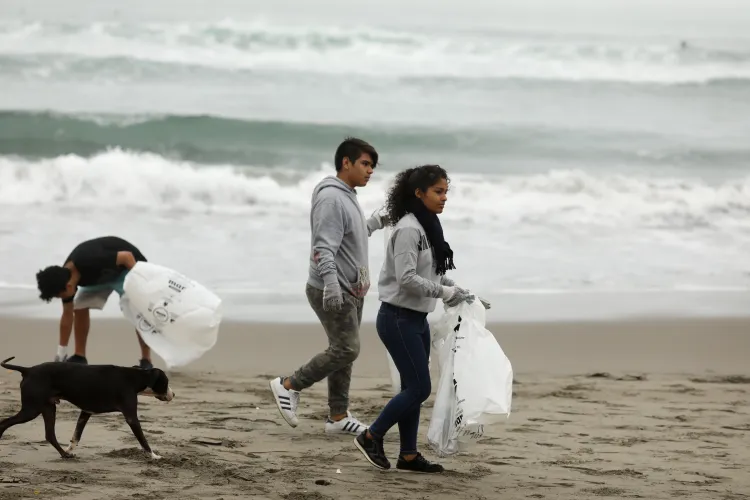What Commitments Did 170 Nations Make in Nice to Protect Our Oceans?

Synopsis
The recent UN Ocean Conference in Nice has seen over 170 countries unite to advance marine conservation. Their collective pledge emphasizes urgent actions needed to protect our oceans, combat pollution, and support vulnerable coastal nations. Discover the remarkable commitments made during this pivotal gathering.
Key Takeaways
- Over 170 nations pledged urgent actions for ocean conservation.
- The Nice Ocean Action Plan includes commitments to expand marine protected areas.
- Significant investments were announced to support sustainable fishing and scientific research.
- Innovative financial instruments, like the Coral Bond, were introduced to mobilize private investment.
- The BBNJ Agreement is crucial for protecting marine biodiversity beyond national jurisdictions.
Nice (France), June 14 (NationPress) The 2025 United Nations Ocean Conference wrapped up with over 170 nations endorsing a mutually agreed declaration that emphasizes immediate actions to safeguard and sustainably utilize our planet's oceans.
The political declaration, titled ‘Our ocean, Our future: United for urgent action,’ advocates for tangible measures to broaden marine protected zones, reduce carbon emissions from maritime transport, tackle ocean pollution, and secure funding for vulnerable coastal and island nations, among other initiatives.
This declaration, along with ambitious voluntary commitments from various states and organizations, forms the Nice Ocean Action Plan, marking a successful conclusion to the five-day conference and a significant advancement in environmental multilateralism.
“The commitments made this week must be rigorously implemented, monitored, and expanded,” stated Li Junhua, the United Nations Under-Secretary-General for Economic and Social Affairs, and Secretary-General of the conference.
“The momentum we have built must propel us toward COP30, as well as global and regional ocean discussions, translating into decisive actions at the national level.”
Among the voluntary commitments made during the conference were: The European Commission announced a €1 billion investment as part of its Ocean Pact to support ocean conservation, scientific research, and sustainable fishing practices.
French Polynesia vowed to establish the world’s largest marine protected area, safeguarding its entire exclusive economic zone, which spans approximately 5 million square km (1.93 million square miles).
New Zealand pledged over $52 million to enhance ocean governance, management, and scientific research in the Pacific Islands.
Germany initiated a €100 million program aimed at the recovery and removal of legacy munitions in the German Baltic and North Seas, a pioneering effort.
Indonesia, along with the World Bank and other partners, introduced a Coral Bond, an innovative financial tool aimed at attracting private investment to protect coral reef ecosystems within marine protected areas in Indonesia.
A coalition of 37 countries, led by Panama and Canada, launched the High Ambition Coalition for a Quiet Ocean—the first political initiative at a high level to address ocean noise pollution globally.
Italy allocated €6.5 million to enhance surveillance by the Coast Guard in marine protected areas and on oil platforms, including a satellite system for real-time detection of potential oil spills.
Canada contributed $9 million to the Ocean Risk and Resilience Action Alliance, aimed at helping Small Island Developing States and coastal developing countries increase their climate resilience through nature-based solutions.
Spain committed to establishing five new marine protected areas, ensuring protection for 25 percent of its marine territory.
A collective of UN agencies and global partners initiated a co-design process for One Ocean Finance, a groundbreaking initiative to unlock billions in financing from industries reliant on ocean resources and blue economy sectors.
A UN Ocean Conference report, detailing the voluntary commitments, will be released post-summit.
In a significant move towards the implementation of the agreement under the United Nations Convention on the Law of the Sea concerning the Conservation and Sustainable Use of Marine Biological Diversity of Areas beyond National Jurisdiction (BBNJ Agreement), 19 more states ratified the agreement during the conference, with 20 additional signatures, raising the total to 136 signatures and 50 ratifications, including the European Union.
Only ten more ratifications are required for the agreement to take effect.
The BBNJ Agreement, adopted in June 2023, is a vital legal framework to protect marine life and ecosystems in the two-thirds of the ocean that lie beyond any national jurisdiction.
From June 9 to 13, 55 heads of state and government, along with 15,000 participants from civil society, business sectors, and academia, convened at the UN Ocean Conference co-hosted by France and Costa Rica, featuring over 450 side events aimed at accelerating action and mobilizing all stakeholders to conserve and sustainably utilize the world’s oceans.
Ten ocean action panels generated forward-looking recommendations to direct implementation across critical themes, including marine pollution, nature-based solutions, and the roles of women, youth, and indigenous peoples in ocean governance.
The fourth UN Ocean Conference in 2028 will be co-hosted by Chile and Korea.








